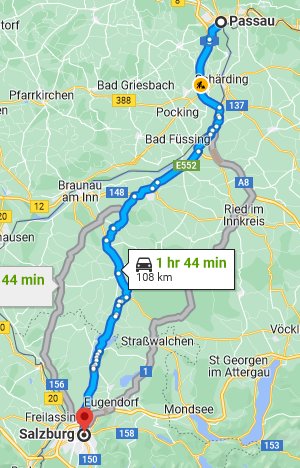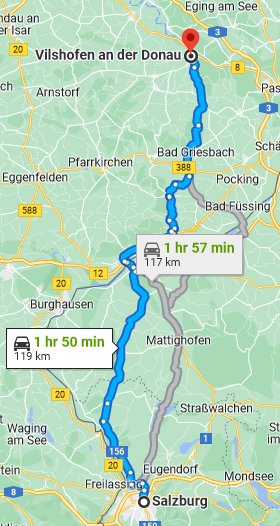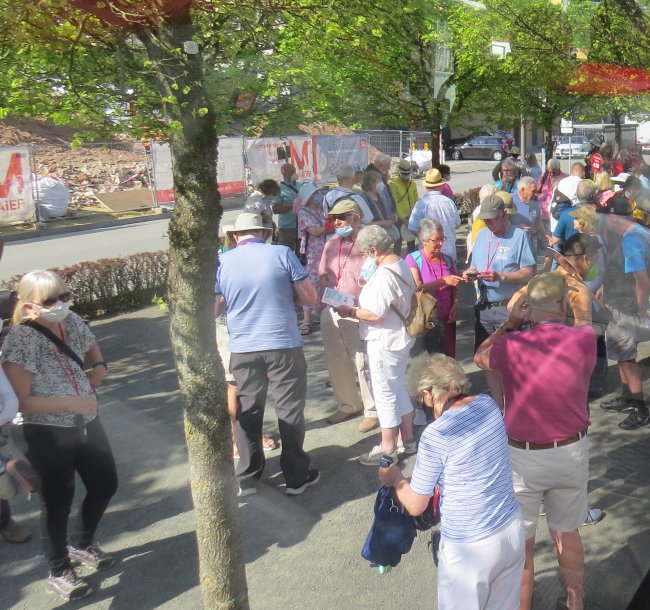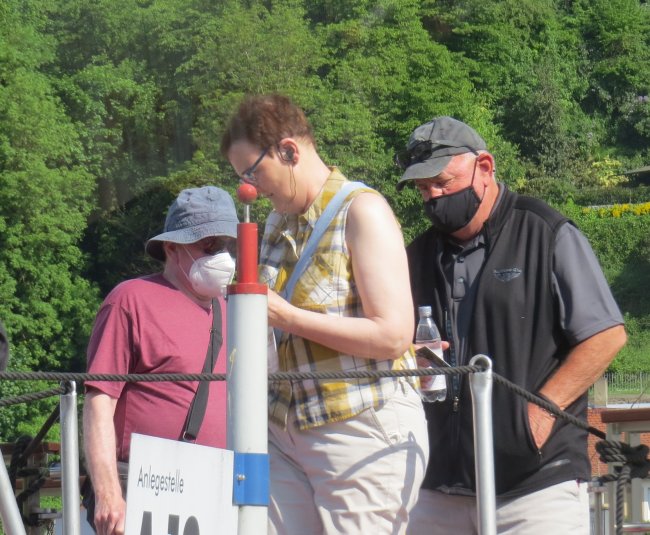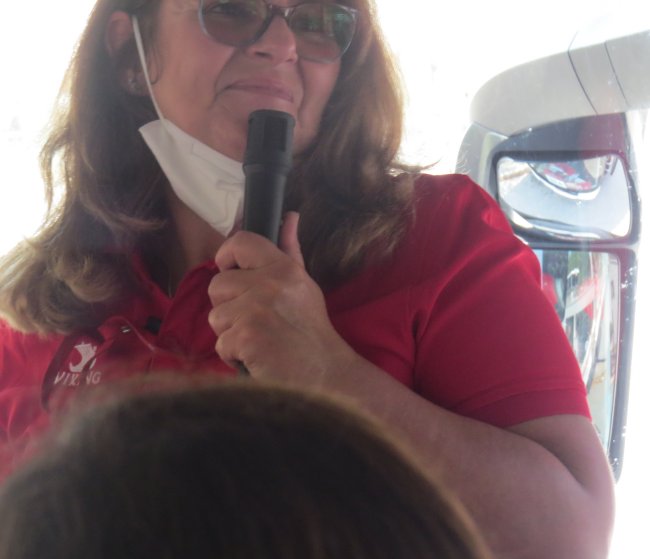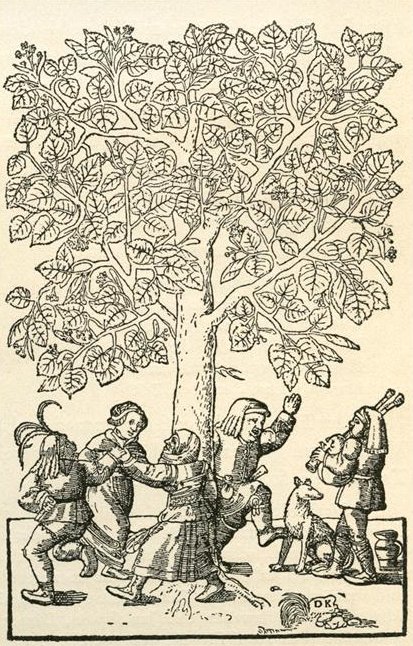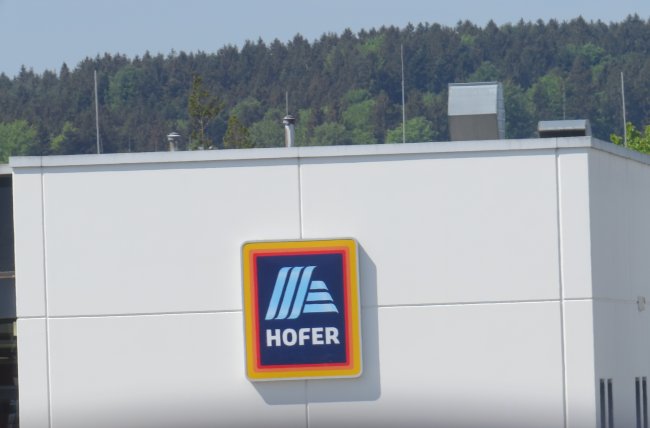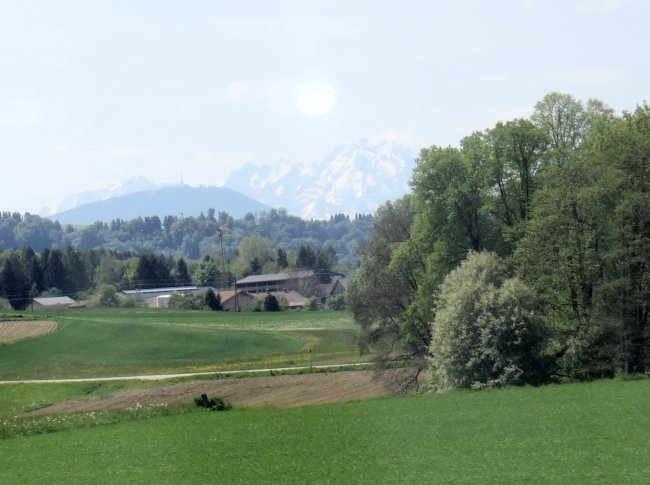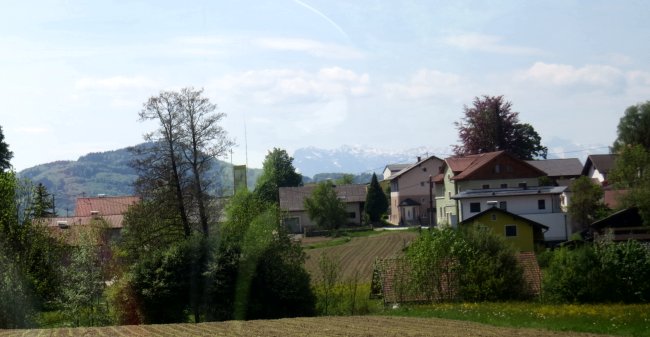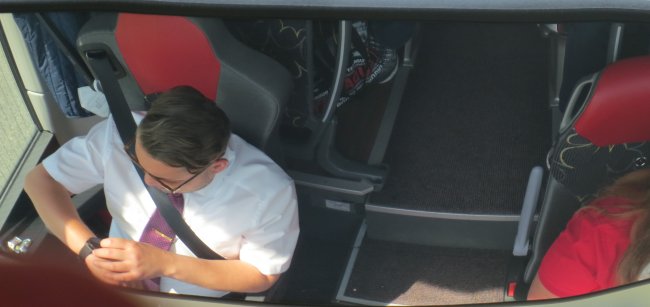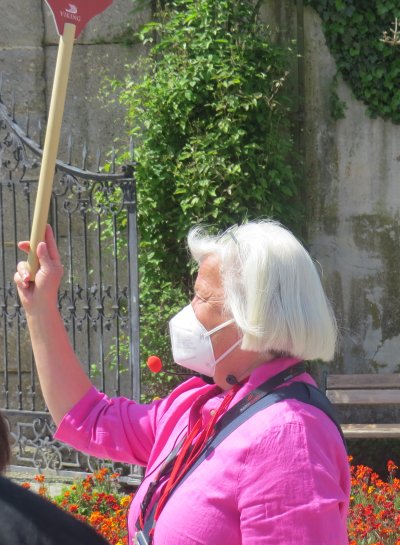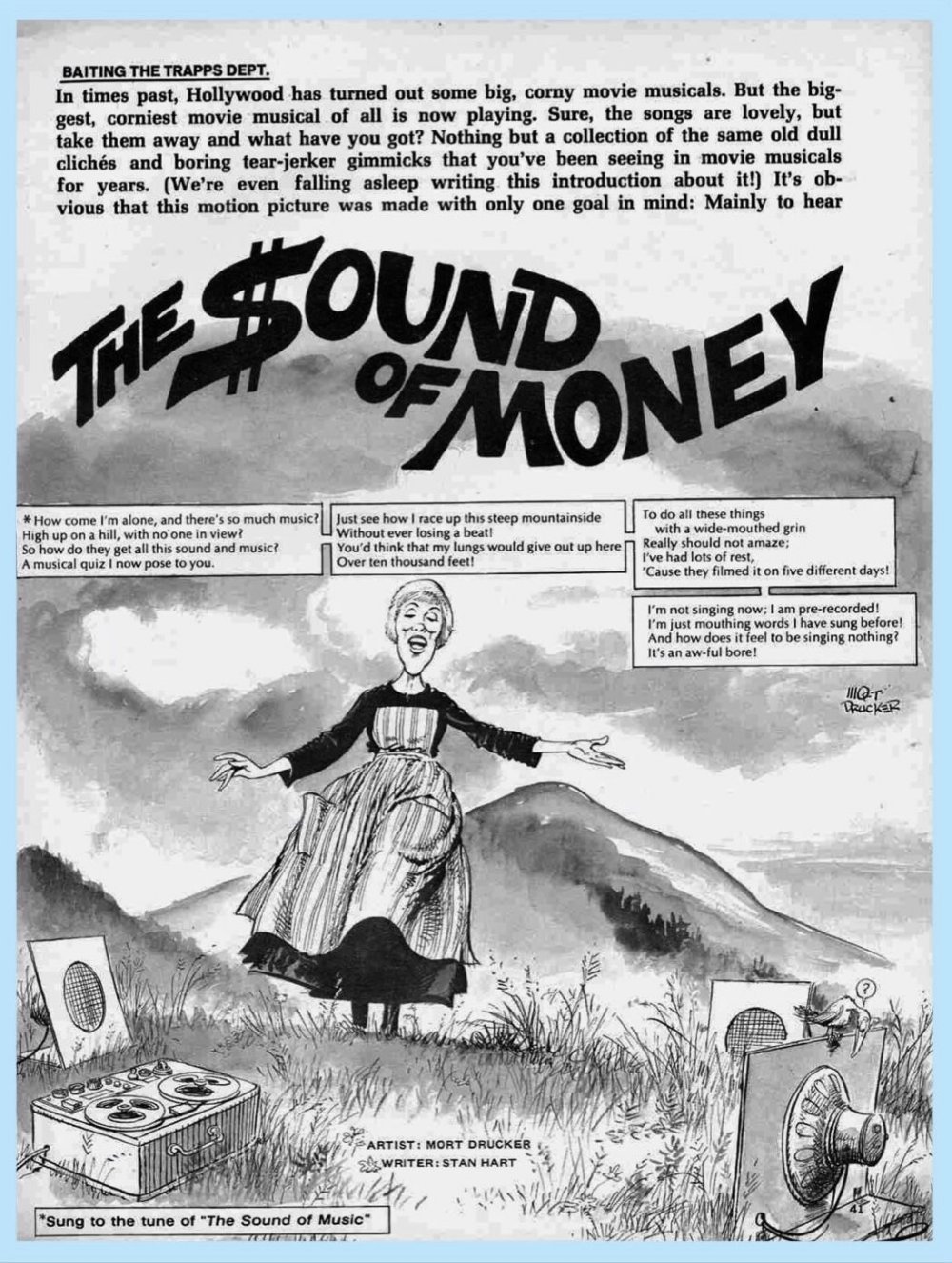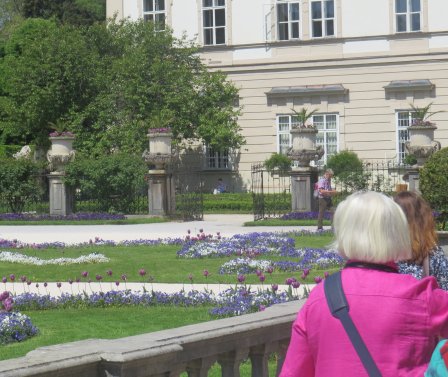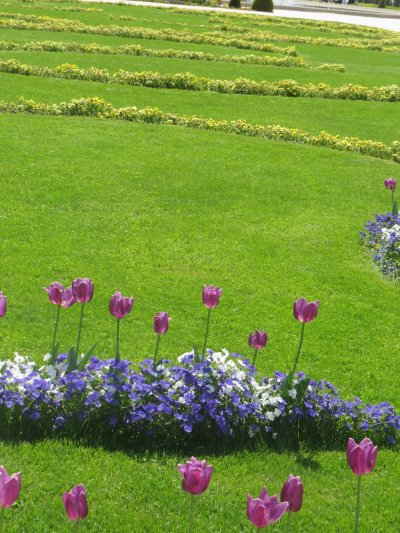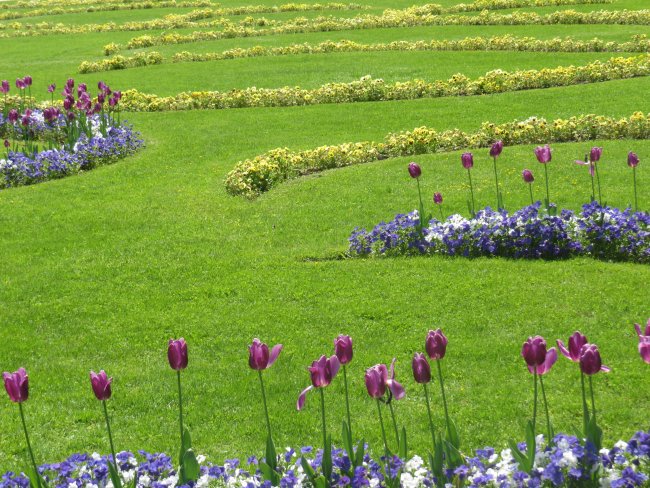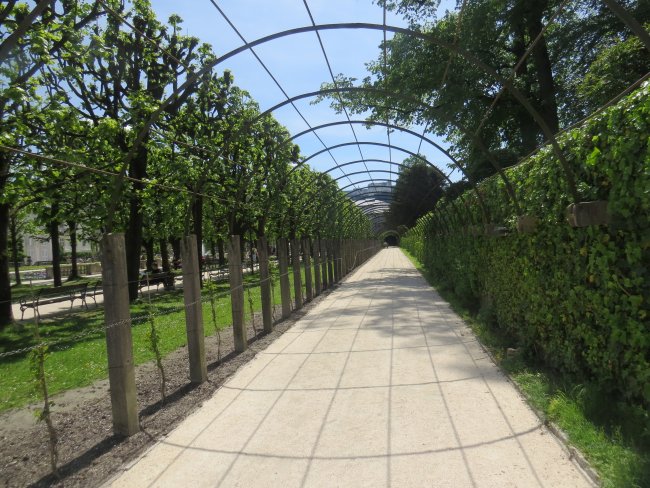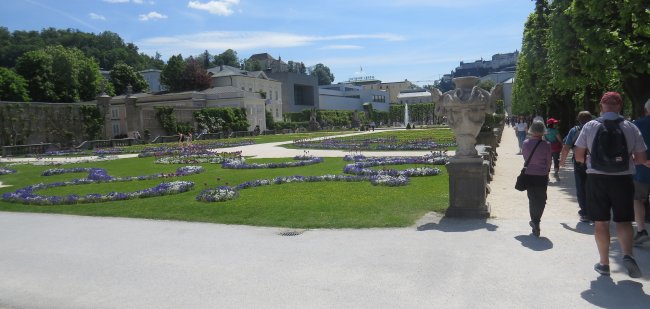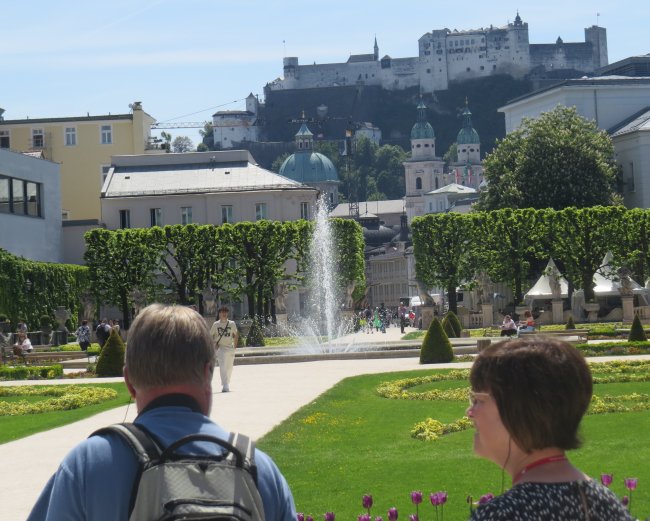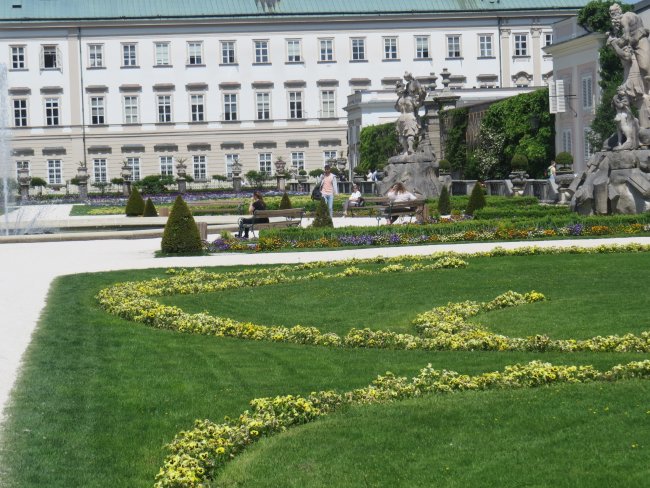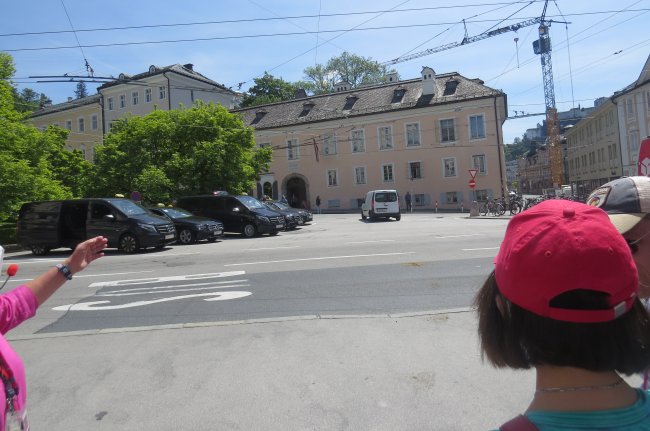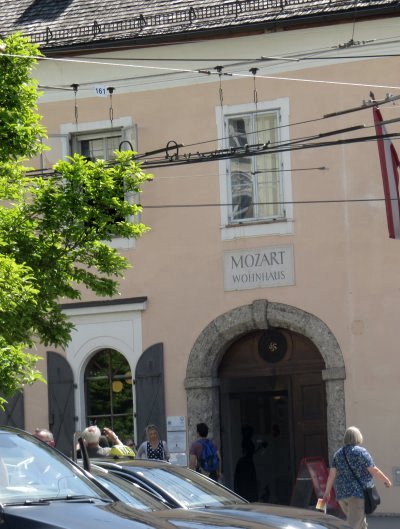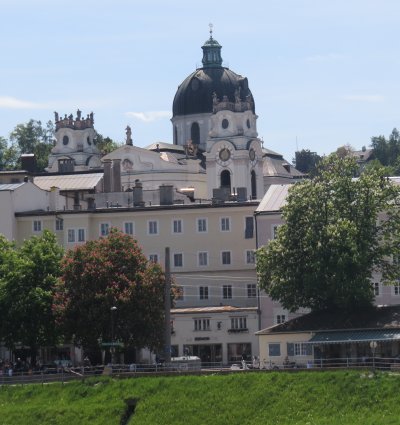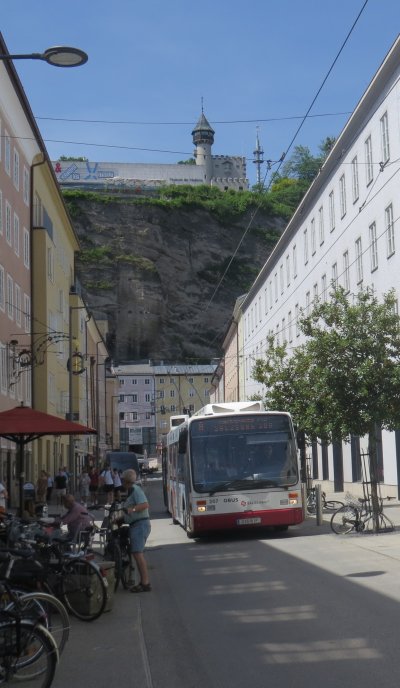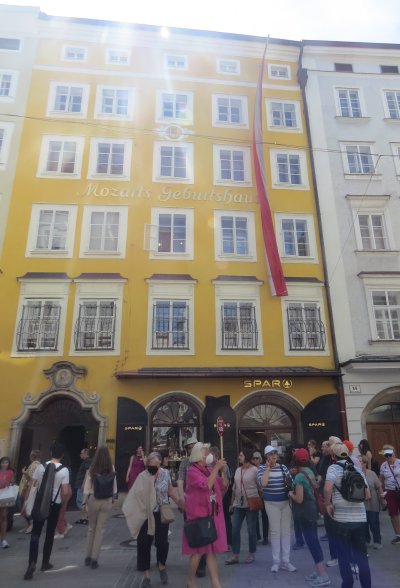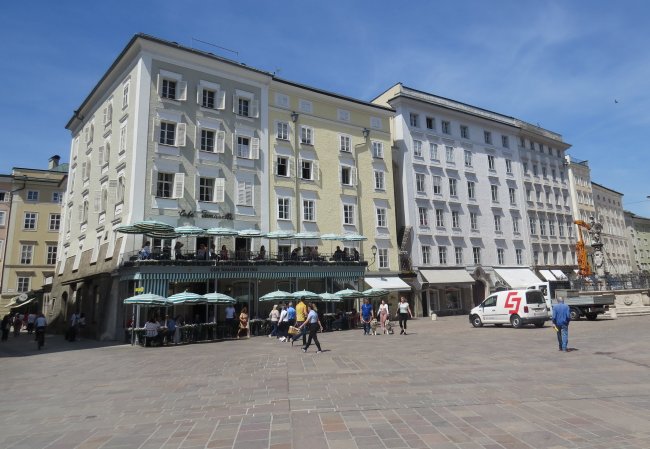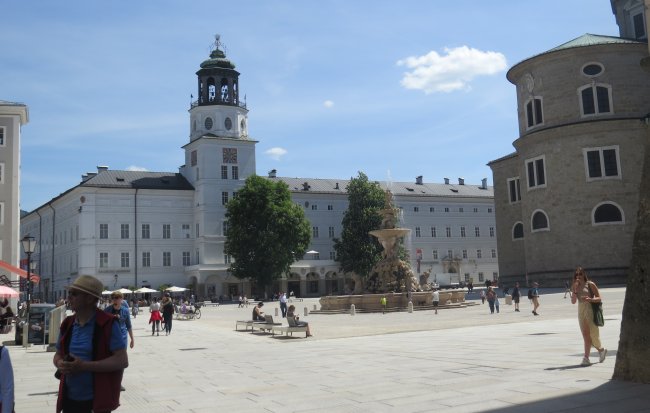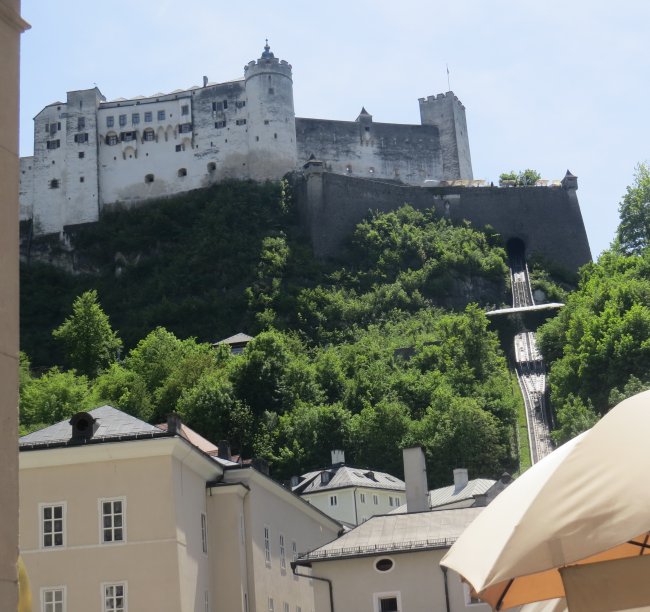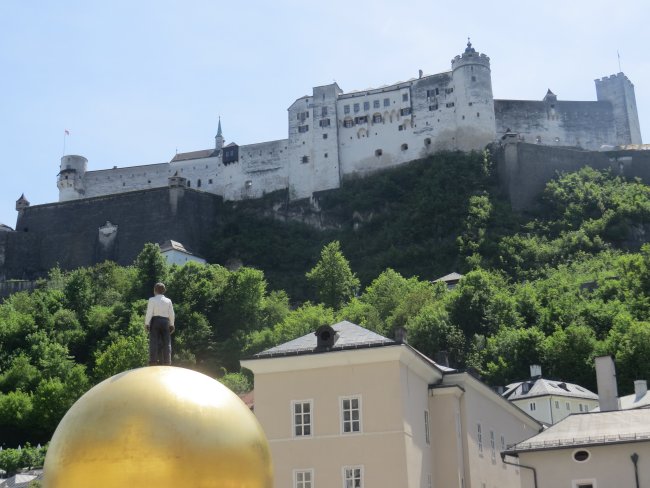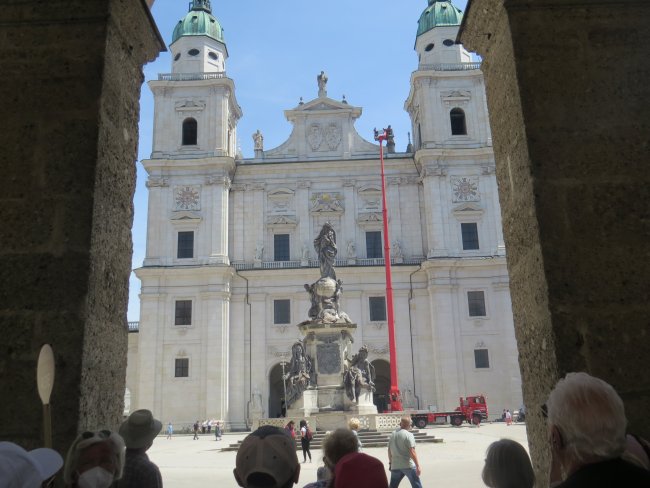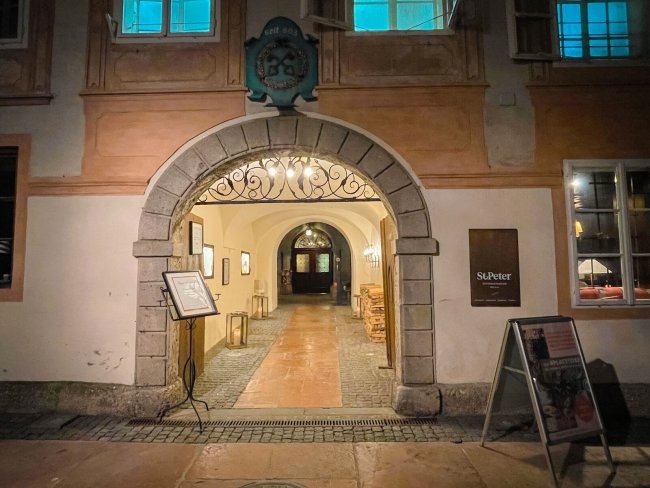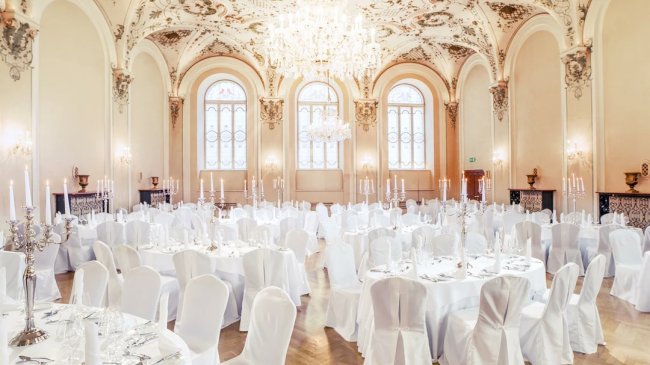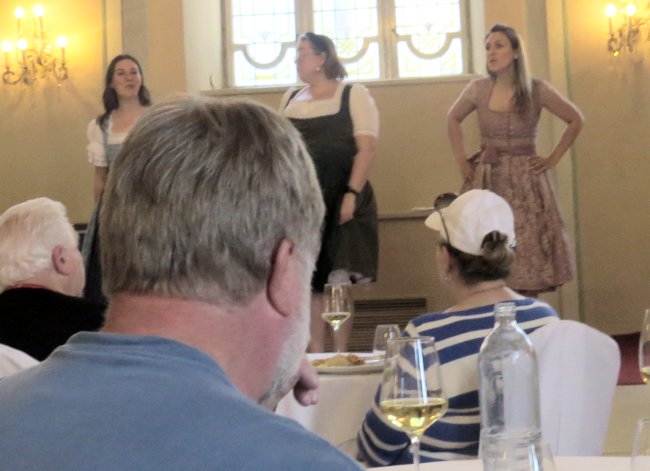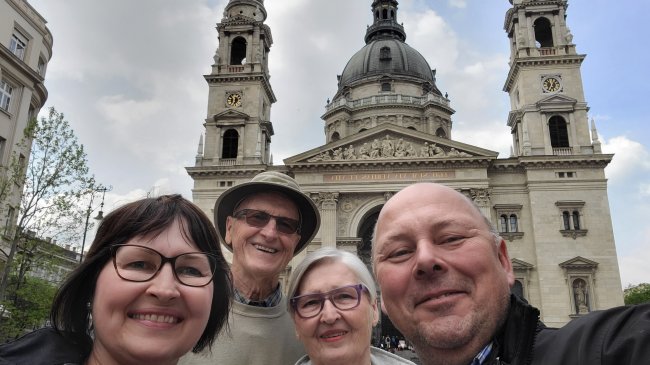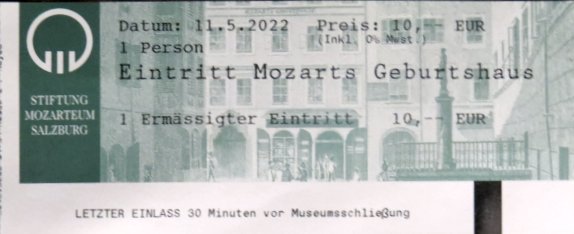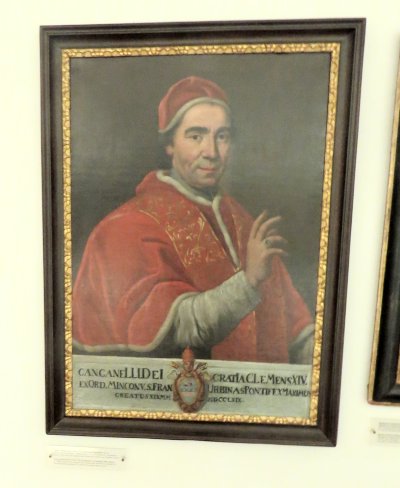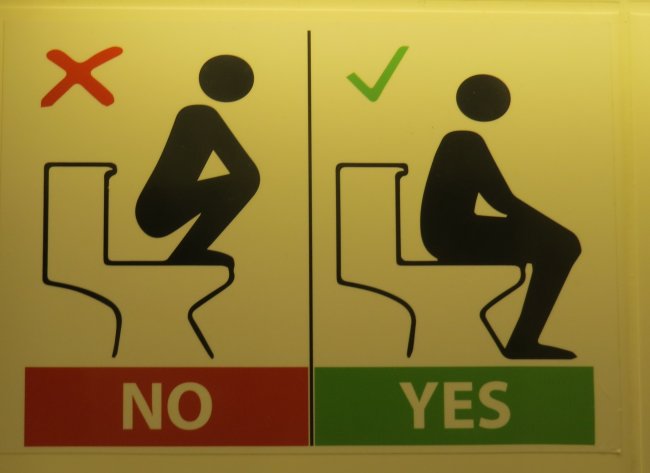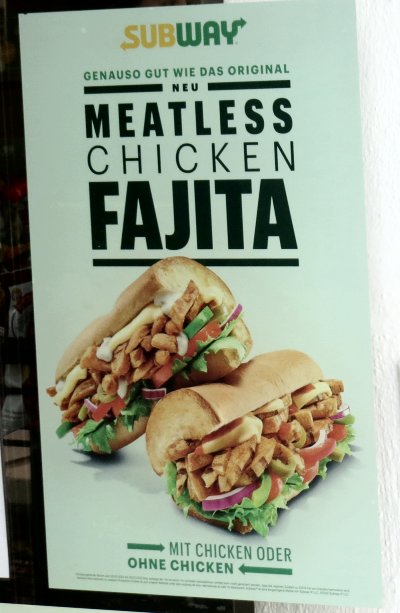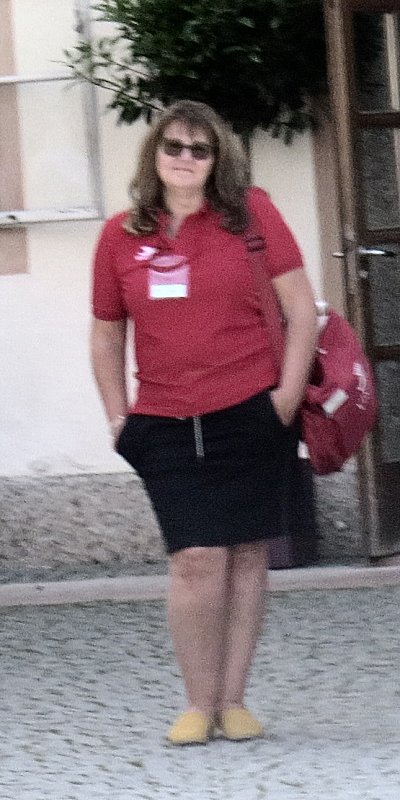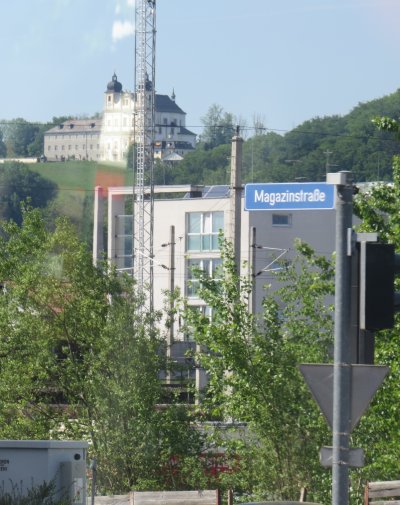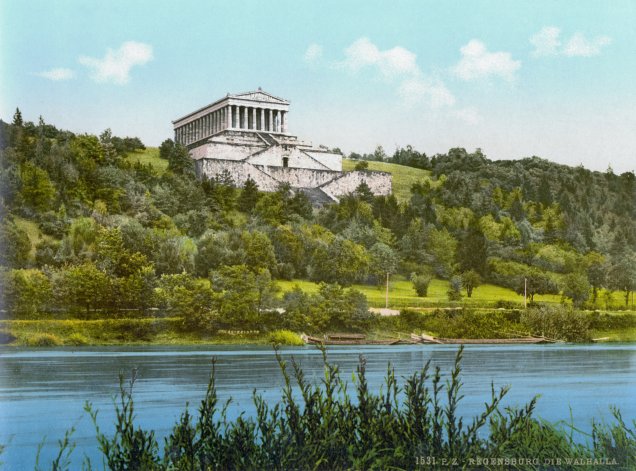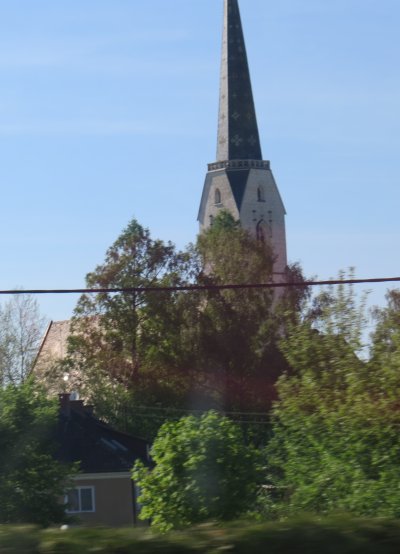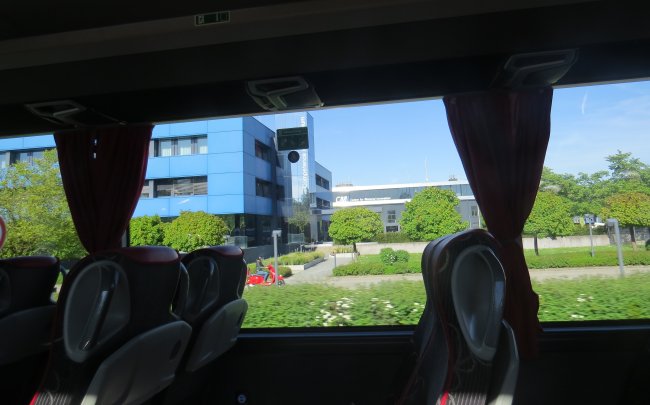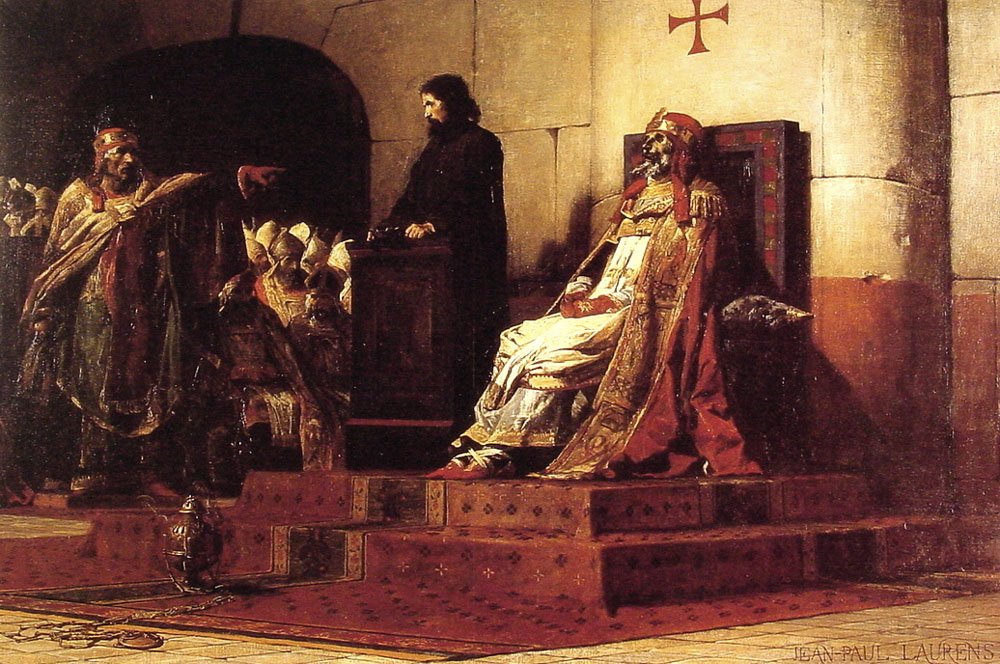Before the excursion to Salzburg: I awoke at 2 a.m., alert with the realization that I was totally unprepared for the excursion to Salzburg. There would be some free time, and I needed to take advantage of it. Viking has an app that allows you to look at the details of your journey. I tried to use it on my phone, but it would not let me. Presumably, this was because the laptop was already connected to the Internet.
I therefore dragged the suitcase out from under the bed and withdrew the Rick Steves book on Vienna. It had a section on Salzburg that convinced me that if I should only explore one place on my own, I would visit Mozart's birthplace.
I then read a few pages from my library book. When the page started swimming I turned off the lights and fell back asleep.
Breakfast began at 7:00. I was up by then, and I made my way to the restaurant almost as soon as it opened.
From the Viking Daily I learned that the ship was scheduled to dock in Passau, Germany, at 9:00. I had never been in Germany, and I would not be there for long this time. The excursion to the Austrian city of Salzburg was scheduled to depart at 9:15. Gary Nicholson, the ship's Program Director, had warned us to bring our passports. Evidently they might be checked when we crossed back into Austria.
I was surprised to see that we would reboard the ship in Vilshofen, Germany, at 6:15. The "My Viking Journey" website had specified that we would return at 6:45. So, thirty minutes had already been lopped off of the excursion, presumably from free time.
Furthermore, Gary announced that we would be docking in Passau fifteen minutes late. Therefore, the excursions would start fifteen minutes later. Although he assured us that this would in no way affect the excursions, he did not say how it was possible to subtract fifteen minutes with no effect. This convinced me that I needed do whatever I could to maximize the free time.
In fact, the gangway that connected Deck 3 of the Vili to the dock in Passau was ready at 9:26, at which time Gary made this announcement:
The bus ride to Salzburg: Only one busload of people took the nine-hour excursion to Salzburg. When I got on the bus, the tour guide took my ticket and asked me if I was traveling alone. When I affirmed as much, she said, "Whoo hoo! That's how I travel, too."
We learned on the bus that we would have two tour guides, Heike on both bus trips and Sisi for the walking tour of Salzburg. The driver's name was Constantine. He was from Romania.
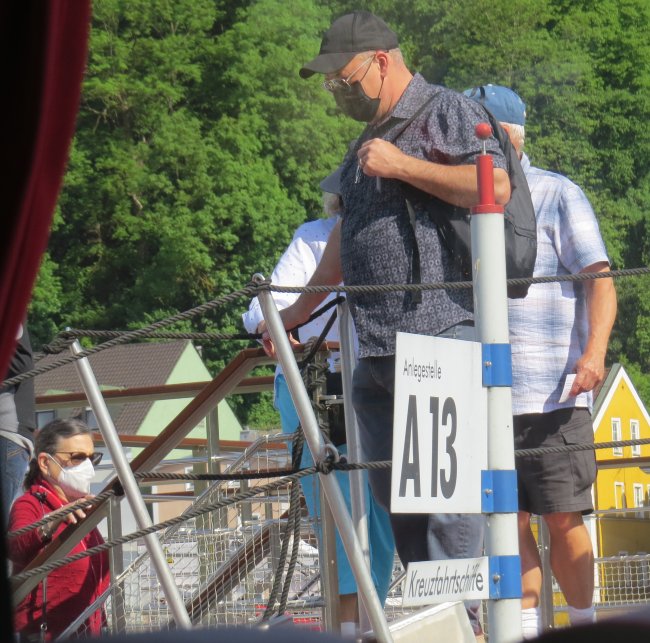
Heike's English was fluent, she was a wealth of information and humor, and she was not shy about sharing her opinions, most of which to me seemed sensible if not mainstream. She began with a little information about Passau, a city of about 150,000 people.
Heike directed our attention to a bridge over the River Inn, which in this area served as the border with Austria. From that point on a river was within a mile or so on the east side of our route through Germany. After we crossed into Austria at about the half hour mark, we were sill within a mile or so of Germany.
Heike asked if everyone had brought their passports. "If not," she said, "I have an Italian colleague from Sicily. The price is not to talk about. You just pay." As it turned out, we needed to display them neither when we crossed into Austria nor when we crossed back into Germany on the return trip.
She then said that "a lot of people" who are on vacation in Germany and Austria do it by bicycle. She even said some go as far as Budapest. She pointed out hotels with very small windows that catered to this adventurous group. They offered no services and "no Viking food".
In Germany driving on the Autobahn was described as horrible during the week because of the overabundance of trucks. On weekends, however, trucks were not allowed on them. "The trucks are parked everywhere."
The speed limit for trucks was 80 kilometers per hour or, for some, 90. Heike said that the Romanian truck drivers chase one another, but they can't catch the truck their chasing. "We call that elephant racing."
According to Heike the Austrian drivers are much too relaxed with their coffee and the music in their ears. "Hakuna matata." The Germans, she said, are never relaxed. She then related her driving experiences in Paris, Amsterdam, and Switzerland.
Heike asserted that the wonderful weather that we had been experiencing was unusual. At this time of year the residents were accustomed to "four seasons in a day", ending with snowshoes, at least in the mountain areas.
At this point we approached the checkpoint where the German border officials could check for passports. Heike described a recent refugee crisis in which at least three thousand people were coming in every day and sleeping in people's gardens and along the side of the road. She claimed that the biggest problem was that trucks from eastern Europe had been smuggling in trucks full of baby cats and baby dogs—up to six hundred in a truck! The previous week the authorities had even found a baby panda bear.
At about fifteen minutes into the journey we "left the Autobahn (bye-bye to the A3!) and turned into the wonderful landscape of Bavaria." The farms were growing corn to feed the pigs and cows. The Germans, she claimed, did not traditionally care about quality, but the "new generation" was turning to organic food. During the time when there was no tourism because of Covid she had worked at a farm that had ten thousand chickens. Since then she had bought her eggs at a local farm.
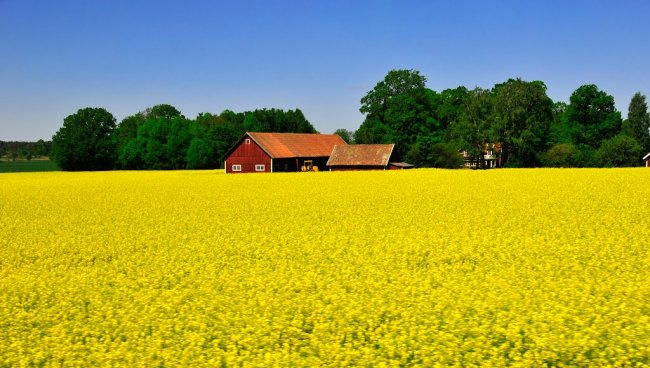
We passed by many fields of yellow flowers, which she identified as "canola"[1], which is sometimes made into oil. In this area, however, Heike said that they usually grind it up to increase the amount of oxygen in the soil. The state pays the farmers to grow the canola for one year to feed the bees and to give the soil one year of rest.
We then passed a biomass facility that produced electricity from "cows' poo". Germans are looking for new ideas about how to produce electricity. They are not starting any more nuclear plants, and the war in the Ukraine has forced them to rethink everything about sources of power.

Heike opined that the people of Bavaria were fiercely independent. Some seemed to think that they lived in a separate kingdom, as their ancestors once did. In 2022 they were coming up with creative ways to provide power. Solar panels were becoming prevalent, and wood pellets were being used for heating. Later we passed a large factory that produced such wood chips. Their business was booming.
We came to a town named Pocking that epitomized the Bavarian attitude:
Heike reported that housing prices in Germany "were exploding". In 2018 she had purchased a flat measuring 65 square meters for €83,000.[2] In 2022 it would go for at least 160,000. She said that her daughter and son-in-law paid €2,500 per month for rent, a sum that was more than Heike earned in a month. The interest rates were now going up, and it was hard to obtain construction materials.
Heike pointed to a group of similar houses that were built in a circle. She said that the Bavarian people who lived in arrangements like that had been there for ten or twelve generations. When the family grew they just added another house. This arrangement made them all "quite rich". The old people do not go to nursing homes; they stay at home and are helped by their relatives. "Very powerful people they are."
We passed by the town of Bad Füssing. It was famous for its sulfurous hot spring. The water came out at 50° or 60° Centigrade, so hot that, according to Heike, "You could cook your eggs." There were three big spas in town that charged no more than €15 per day, and half of the price was paid by the national health insurance. The whole town was a big attraction for single Germans. Discotheques and places with other types of music kept the party going in the evening. There were numerous hotels in every price range. "Oh, what you do in Bad Füssing stays as a secret."
When Germans go on vacation they take the car and bring bikes. When they reach the destination they put the car in a garage, and ride the bikes for three weeks.
Just before we crossed the River Inn and entered Austria, Heike pointed out a "Village Linden Tree". People formerly met under these trees in the evenings. Guys came with a beer, and the young ladies also came. "Now they sit at the TV with their mobiles. What is the better life?"
The Inn flowed from San Moritz down to Passau. The current was too powerful for ships. Heike said that there were hydroelectric power plants, but we did not see them.
Kids in the European Union countries could go to school anywhere in Europe. I guess that that was true in the U.S., too, but the cultural differences seemed more pronounced in Europe.
Heike then felt compelled to tell us about the two female white cats, Bigby and Lazy Lu (or something like that), that she very reluctantly agreed to raise at the behest of a co-worker. They are now ten years old and have adopted an Austrian lifestyle—"always relaxed, always kisses, always hugs".
She then described the layout of the farm houses that had been used in this area since the ninth century. The houses had small windows and one big door, and they were built around a central area in which the animals stayed. The idea was to protect against criminals.
Constantine took the wrong road, which cost us a bit of time for "a little detour". Heike claimed that it was her fault. She said that she had been talking too much. She urged us to just say "Heike, shut up!" if she went on too long. She would be all right after she cried a little.
A century ago (?) the area was very rich because of the salt trade, but now it is just private land, predominantly agricultural. Heike also mentioned that they receive about six and a half feet of snow here. The Eagle's Nest, Hitler's summer residence, was very close to Salzburg. Incidentally, her pronunciation of Salzburg was very close to SITES burk.
In the olden days Salzburg, which called itself the Rome of the North, was ruled by a Prince-Archbishop. In the eleventh century 30,000 tons of salt were shipped down the Salzach and Inn rivers to Passau every year. Thirty barques, sixty strong men, and some horses that walked along the river bank were required for the journey, which took them more than a week.
Passau also was ruled by a Prince-Archbishop, and both cities prospered by devoting all of their energy to the salt trade. Neither had any craftsmen worth mentioning. This worked fine until Napoleon upset the apple cart in 1803. Heike pronounced the "difficult word" for the process of separating civil and religious authority and emphasizing personal freedom with a French accent. I could not make it out.
Before the pandemic eight million tourists a year visited Salzburg. Heike said that the people in the area realized that they depended on the visitors, and they were generally helpful. They were all very happy to have the tourists back after the two years of isolation.
Heike showed us on the city maps where the bus would leave us off, where we would eat lunch at the end of the walking tour, and where we needed to assemble at 3:40 to return to the ship. She also provided her mobile phone number.
Mozart, who was born and raised in Salzburg, was a rock star, but he did not bathe. Unlike Freddy Mercury he preferred the ladies.
Heike reported that there was a little shop in town that sold hazelnut schnapps. The owner was a "typical" shopkeeper.
"The pope" in the seventh century decided that the cemetery in towns and villages should be near the church because the dead were part of the parish. Church towers were ordinarily placed on the side away from the river.
Heike spotted a farmer harvesting the "first cut for the horses". I could tell that this gave her a little thrill.
In Bavaria "Vegetarians are called the bad hunters."
The style of the churches in Salzburg was baroque. The message to the people, who could neither read nor write, was that God was good and helpful. When baroque ran wild, it was called rococo.
In the towns in this area the butcher's house was always red. The bakery was painted blue. The brewery/restaurant was always yellow. In most of these towns the owners of these houses were not allowed to change the color of their houses. Wooden ornaments were affixed to the doors to help people find their way in the dark.
The price of gasoline in Austria was about $8 per gallon.[3] It was much higher in Germany. Heike drove a Toyota Yuris hybrid and got 200 kilometers per gallon.
Heike reported that the people planted geraniums because mosquitoes seemed to hate the smell.
The historical center of Mattighofen featured Austrians driving using the "Hakuna matata" style that drove Germans crazy. Heike predicted that the Austrian police would be hiding in the cemetery looking for drivers to fine €50 for not using a turn signal. However, they disappointed her. The fašade on one house described the history of the town in pictures and words. KTM bikes were manufactured in Mattinghoven. A swimming area was open; this was beyond unusual for early May. We could see the mountains pretty well at this point. The highway went right through the heart of town, and it was very narrow. "People don't walk on the road, not if you love your life."
The McDonald's in Salzburg had free WiFi. Sisi would reportedly show us where Mozart was born. Heike suggested that someone should ask her what caused him to die so suddenly. The restaurant in which we would eat lunch is next to St. Peter's Abbey. The menu was chicken polenta with egg-white with sugar (meringue) for dessert. They would serve us wine from their own vineyards. The nearby cemetery, according to Heike, was magical, and the quality in the shops throughout Salzburg was very high.
Salisbury was famous for its Mozart balls, a confection made of pistachio, marzipan, and nougat covered with dark chocolate. Heike said that they were fantastic, but they had "one million calories per bite." She warned us that if we bought them at the original store, we should not buy the plastic boxes. She also told us to put them in the refrigerator in our room. "No matter how many you buy, they will not make it home. You will eat them."
We passed a store selling Pall Green shoes. Heike claimed that they were the nicest and most comfortable shoes for ladies. However, we were not allowed to stop.

Matt Lake had turned into two smaller lakes because of climate change. Heike said that she wanted to live in that area. If someone gave her $1 million, she would buy a house there. Later, however, she mourned that $1 million would probably not be enough.
Heike claimed that the next lake that we saw, named Obertrum, was so cold that if a rather old man entered it, he would come out as a young girl. The lake was mostly used for fishing.
Heike said that the word "taxi" was derived from the family name Thurn und Taxis.[4] They mostly delivered messages for the nobility and the Church, but they later also transported people. They also had a castle in Regensburg.
The bus passed a house that looked like a VW Bug (Heike said "buck"), but we barely got a glimpse of it. Heike said that her family had had one when she was growing up. Tourists can rent the house.
As we entered Salzburg we passed the main train station. Heike said that the fare to Munich was only €30. The journey lasted about an hour.
On the right was an automobile dealership that had large glass windows behind which several models of new cars were parked in a row. Heike expected them to have a Porsche on display, but she was disappointed, but "the Audi cabrio is nice."
In the winter skiers can get from Salzburg to the top of the mountain in about thirty minutes. Three mountains surround the old part of Salzburg: Kapuzinerberg on the other side of the river, Münchsberg behind the city, and, behind it, Rainsberg.
This was the most informative and pleasant long bus ride that I have taken in a long time. Heike's narrative brought a smile to my masked face many time that day and equally often to my unmasked face as I played the recording more than a month later.
The walking tour of Salisbury: I must start with a confession. I have never seen The Sound of Music. I have never liked musicals very much. When I heard somewhere that it was one of the favorite movies of Richard Nixon, the man who had contrived to prolong the Vietnam war, thereby causing me to get drafted into the army, I resolved never to watch it. I just have no interest in it; I came to Salzburg because of Mozart and the town's interesting history.
The Sound of Music, was filmed in 1964 and released in 1965. Of course, I had heard many of the songs. This was, however, the era of the early Beatles and the British invasion, and I was in high school. I had little interest in whether the hills were alive. My vague ideas about the plot came mainly from Mort Drucker's Mad Magazine piece that made fun of the fact that Christopher Plummer's character had been a naval officer in a land-locked country. I had also viewed a few travel shows on television that featured Salzburg.
Sisi punctually met us at the dropoff point. It was not likely that we would lose track of her in the crowds that day. She was wearing a bright pink long-sleeved outfit on a warm sunny day. Many people were sporting shorts and tee shirts.
The walking tour began in Mirabellgarten on the northwest side of the Salzach River. Evidently some scenes in the movie were shot there. Sisi emphasized that there had been severe misunderstandings about the filming. At the time of the shooting and even for a considerable period thereafter the people in Salzburg did not understand what the film was about. The Nazi banners that the crew hung in the courtyard infuriated the residents, who by then wanted nothing to do with the Nazis.
At the time two films about the von Trapp family were already very successful in Germany and Austria. When the dubbed version of The Sound of Music was finally released there, the people were initially skeptical about it because much of it seemed inaccurate to them. Hollywood, as usual, had merely taken some liberties.
It took many years for the area to embrace The Sound of Music (or should I say, "The Sound of Money"?) as a tourist attraction. Today, of course, people might visit Salzburg solely for the purpose of immersing themselves not in the world of the von Trapps, but in the world of the Hollywood performers.
Before we crossed the bridge to the old town Sisi drew our attention to the house where the Mozart family moved after they started to achieve financial success.
Both Mozart's birthplace and the second house have been converted into museums that competed for tourist euros.
During our walk Sisi pointed out some of the buildings that were of particular interest either historically or currently. Because we were using QuietVoxes, I did not record her narrative. Since I had determined that we would be allotted only enough free time to visit one attraction after lunch, I concentrated on remembering where Mozart's birthplace was.
If memory serves, the first two photos above are views of the same public square. I think that this is the one used for filming a scene in which Julie Andrews runs across with her suitcase. Sisi informed us that the real Maria von Trapp had appeared uncredited in that scene.
Our walking tour ended at the Stiftskulinarium restaurant, which was in the building next to St. Peter's Abbey. Heike was already there. Sisi and Heike led us to the Barocksaal, one of eleven dining rooms in this facility.
I don't think that anyone asked Sisi why Mozart died at such an early age (35). If anyone did, I don't remember the answer.
The incredibly elegant room was already half full when our group entered. Evidently passengers from another Viking cruise had taken the seats furthest from the small stage with a piano. Most of the tables that remained were set for two people and faced the stage. I gravitated to a big table in the middle that was eventually occupied by Heike, four people from Saskatchewan with whom I became better acquainted later, and another woman in a red Viking shirt whom Heike seemed to know well. The four Canadians were Steve Flaman and his wife Denise, her mother Bunny, and Bunnie's husband Ed.
I had no idea that there would be entertainment, and so I had seated myself with my back to the stage. I had probably selected the worst seat in the house. That was OK. Three young ladies performed short scenes from The Sound of Music, each of which ended in a song. I was probably less interested in this than anyone else in the room.
I turned on my recorder, but the waiters and waitresses were serving us during the entire performance, and the clanking of dishes at our table and ones nearby rendered it unsuitable for public consumption.
The lunch was very good. Nevertheless, as soon as my plate was picked up, and the show was concluded, I made a hasty exit before dessert was served. So did the Canadians. I did not see anyone else leave.
Although I admit to having experienced some difficulty in finding the restaurant's exit, once I was outside I quickly got my bearings and headed down Hofstallgasse, the long wide street at the foot of the mountains. As I passed the university I imagined that the three singers and the pianist were probably either students there or fairly recent graduates.
When I reached Getreidegasse, I still needed to walk some distance to reach the birthplace house. I finally entered #9, bought my ticket and walked up the wooden stairs to the top floor.
I was, of course, mildly thrilled to come across a very faded portrait of a pontiff in the museum. I did not immediately recognize the subject of the painting as Pope Clement XIV, but when I read the inscription I realized that he was the pope who had been pressured into disbanding the Jesuits in 1773. I wrote about this here
I knew that Mozart had been to Rome, but I did not know about his relationship with Clement XIV. It is described in delightful detail here.
The museum was interesting, but not really satisfying. A lot of valuable information was provided about Mozart and his family. There were also a few interesting items related to them. I especially enjoyed the family tree and the detailed information about his many journeys as a youth.
Of course, none of this explained the big question of how he managed to compose so much music of the highest quality so rapidly. I have read somewhere that he could write original pieces as fast as the copyists could duplicate them. I suspect that his brain was somehow wired so that he thought in large musical chunks that he could mentally reshape and assess in his head in practically no time.
I had the presence of mind to visit the public restroom in the museum. Displayed above is the bizarre sign that was displayed over the toilet. I seriously doubt that most aficionados of Mozart would even be capable of successfully executing the "NO" position.
I had a few minutes to kill before our appointment at 3:40. I decided to walk toward the meeting point and see if I could find a store that sold any of the implements that I was still lacking. I walked up and down two or three streets, but I did not enter any establishments.
While searching for quotidian retailers I passed by a Subway restaurant. The colors and design of its logo were the same as in the U.S., but the item that they were promoting with a poster on the door was not one that I had heard of. What exactly could a "meatless chicken fajita" contain? Beaks and toes? Feathers?
I think that the last photo shown above might be the hotel in which Christopher Plummer supposedly held parties every night. Julie Andrews reportedly stayed in a different hotel.
The bus ride back to the ship: Heike announced that she would not talk as much on the return trip. She said that she would instead play some relaxing music to induce "closed eyes". I could barely hear the music from my seat halfway back in the bus. I tried to record it, but the machine's hearing was no better than mine.
For some reasons I could not find anything interesting to photograph through the window. I don't think that we drove through any towns on the way back.
Our destination was the dock at Vilshofen (VEELZ hoe fen, which Gary pronounced VEEL show fen), which was a few miles west of Passau. We crossed the Inn River to return to Germany a little after 5:15. Heike took the opportunity to voice her opinion that the European countries needed to stay together. The European Union had promoted free travel and trade among the European countries, and all but a small minority of the people were happy with it. The countries who had fought one another for decades agreed on a response to Putin's aggression in only three days.
Heike told us about a Greek-style building built by King Ludwig I of Bavaria called Walhalla. We must have passed within sight of it on our voyage to Regensburg, but I did not see it.
Heike then described some of the severe effects of climate change in the area. Although the groundwater levels are down by two meters, flash floods in some areas have been deadly. A friend of Heike's lost three relatives in one. Bavaria has traditionally had monoculture forests of fir trees that were passed down from one generation to another. They were harvested and replanted every ten years. The quality of the wood has lately been decreasing. It can only be used for wood pellets for heating. In some parks, on the other hand, they have not touched the trees for a century, and the animals are returning. "Nature needs time."
Next came a description of hunting in Bavaria. A hunter can obtain a license to shoot one deer. If he is successful, the carcass must be taken to a veterinarian first to make sure that it was healthy. The hunter would then be allowed to keep a bit of it. The rest would go to the butcher. There were also a lot of wild pigs, but eating them was not popular. There was some kind of nuclear accident in the eighties. Heike claimed that the rain brought the radiation into the nearby forest, and the land was still poisoned in 2022. The pigs often slept there. She asserted that people who eat wild boar meat in Germany glow in the dark.
The mountains that were behind us were visible, but they were now foggy. Our ETA in Vilshofen was between 6 and 6:15. "I will order the red carpet out. Then it is up to your leaders." Some white mountains were still full of snow.
The next segment was garbled. She said that there was a pope fifteen years ago named "Johannes".[5] for whom an autobahn was to be constructed. She could not understand how it could take them twenty years to build an autobahn. According to Heike, the Austrian roads were the best. The road and fuel taxes there went to paying for upkeep, which was managed by a publicly-owned company, ASFINAG.
The total tax rate was about 30-35 percent. If a German needed a doctor, he/she called and made an appointment, which would be in 3-5 days. It was all free, as was emergency care. Anyone could make a private contract for extras; Heike had one with her dentist. A night at the hospital cost only €10. Tuition at top universities cost €300-500 per semester. "We are very happy with that situation here." America sucks; let's face it.
Something drew Heike's attention to a local abbey that was famous for very nice dark beer. "That would be so nice to stop there." However, she fretted that Gary would disapprove.
After a fairly long silence Heike played an unspeakably bad song by an Austrian singer. It also had a saxophone solo.
Heike then made some fashion comments that I did not understand. She concluded this segment with the news (to me) that one of the guides in Salzburg was wearing lederhosen. Mostly these were obtained from one's granddaddy. They performed best if used for at least two generations. At that point they could usually stand on their own in the kitchen because they had been used so often to wipe off hands after eating pork knuckles, "Then it's perfect."
People have left all kinds of things in the tour buses. After one group of young people spent the evening partying in the bus one high-heel shoe was found under a seat at the back.
The Vils River ends in the Danube at Vilshofen. Constantine can't drive through town because of a low bridge overhead.
Heike lamented that "We fished here for 800 years; then we ate them all." She said something about a fish called nose (or something like that); I could find no reference to such a fish on the Internet. She said that they were now bringing eggs from fish back into Danube in order to restock the river.
Of course, the ride ended with Heike softly singing "So long, farewell, ..."
After the excursion: At 6:45 Gary gave his nightly "Port Talk" about Regensburg in the lounge. I listened in my room and recorded it. The quality of the sound was not too good because Gary must have been standing near the bartender who was vigorously shaking some kind of drink.
Gary said that Regensburg was famous for the Stone Bridge that was built 1,000 years ago. It was now open only to pedestrian and cyclists. The wooden predecessor to this bridge goes back to the time of Marcus Aurelius.
The excursion to Munich would take all day. There also was a Jewish tour of Regensburg and a sausage-making excursion. It would be possible to walk into Regensburg after lunch. He also mentioned that maps were available at the reception desk.
At supper I screwed up my courage and asked a couple that was seated in the middle section if I could join them. They agreed. Their names were Boris and Marty (or maybe Marly). They were from the Philadelphia area, although Boris, a PhD in mathematics, had a rather noticeable Russian accent. Marty taught probability and statistics. When I told them that Sue could not find her passport, Boris said that in Philadelphia a replacement could be issued with one day, but it was expensive.
Marty claimed that one question in the previous night's quiz had been biased. It asked about the first thing one brings when traveling on vacation. The popular answer was a passport, but, of course, in the U.S. the vast majority of travel is done within the states. Since most of the people on the ship were Americans, they were disadvantaged on this question.I think that I must have given Boris and Marty my calling card, which induced one of them to ask about my interest in the popes. I recounted to them a very short version of the memorable Saturday morning that I learned about the prosecution of Pope Formosus's cadaver.
Boris said that a few years before the downfall of Constantinople the Emperor and the Patriarch of Constantinople came to Italy to to ask the pope for assistance against the Turks. I asked him when this occurred. He said that the Turks took the city in 1453, so it must have been a few years earlier. He also volunteered that the council was at Ferrara and then moved to Florence. This sounded familiar. I was pretty sure that this was contemporaneous with another council in Basel. I told Boris that I would look it up.
I also recall that when I mentioned Heike's strange pronunciation of Salzburg Boris said that he had spent a considerable amount of time in Germany, and the Germans all pronounced it the same as Americans do. He also mentioned that the Swiss version of German might have a different pronunciation.
At some point another pair of couples joined us. One was Mike and Vivienne, whom I met on Saturday evening. The other couple, David and Margaret, were from Glasgow. David was a professor of pharmacology at the University of Glasgow. I think that Margaret had something to do with nursing. Most of the conversation was between David and Mike about various people and places in Glasgow. Mike had gotten his PhD there.
Marty thought that it was intriguing that there were three PhD's at one table. I was not star-struck. In my checkered academic career I had known quite a few people who earned a PhD in speech for whom I had very little respect.
It was an enjoyable supper, although I did not record and do not remember what anyone ate.
When I returned to my room I spent an hour or so researching the Council of Ferrara/Florence, which I had already written about here. I then wrote to Sue a fairly long email describing my experiences during the previous two days.
[1] A guide on a subsequent bus ride identified the crops as "rapeseed". Both were right. Canola is a cultivar of rapeseed that has a low level of erucic acid.
[2] 65 square meters equates roughly to a square of 26.2 feet on a side. In May of 2022 a euro was worth about $1.07. At the time housing prices in the U.S. were skyrocketing, and people were blaming it on President Biden.
[3] In the U.S. the price at the time was about $4.25. The rapid rise in prices worldwide was obviously caused by supply problems exacerbated by the Russian invasion of Ukraine, the sudden pent-up demand from two years of Covid-19, speculation by investors, and price gouging. Nevertheless people blamed their local politicians.
[4] Someone bought a game for us a few years earlier called Thurn and Taxis. Before this trip I never understood the reference. On Day 7 of this trip I tried to visit the family's castle in Regensburg.
[5] She must surely have been speaking about Josef Ratzenberger, who was Pope Benedict XVI from 2005-2013. He was born in Marktl, near Regensburg. He never learned how to drive, and he did not have a driver's license.


